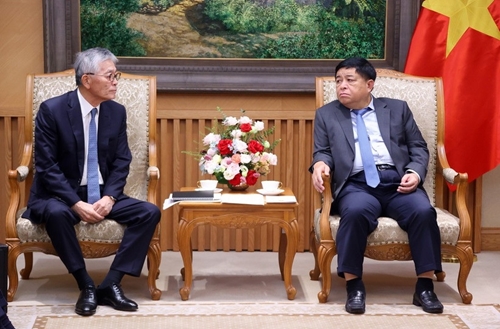During the meeting, the Erex leader presented recommendations regarding biomass electricity pricing and adjustments to foreign exchange rates in power purchase agreements. Additionally, he introduced Erex's scholarship program, which aims to support Vietnam in training human resources for the renewable energy and semiconductor sectors.
    |
 |
|
Deputy Prime Minister Nguyen Chi Dung (right) and Honna Hitoshi, Chairman and CEO of Japan’s Erex Corporation |
Erex, a leading Japanese biomass power company, wishes to develop raw material zones, build biomass power plants and converting coal-fired plants to biomass in Vietnam. The firm has invested in several biomass power plants in Vietnam, including those in Hau Giang (20 MW), Yen Bai (50 MW), and Tuyen Quang (50 MW).
Deputy PM Dung said Vietnam sees renewable energy, including biomass, as a key pillar in its roadmap to achieve net-zero emissions by 2050. Under the current Power Development Plan VIII, the country aims to reach 2,270 MW of installed biomass and waste-to-energy power capacity by 2030.
He welcomed Erex’s contributions to Vietnam’s energy transition and affirmed government support for projects that align with national planning and comply with local laws. He also acknowledged Erex’s concerns about pricing and contract terms, noting that the current price range has been calculated based on multiple factors, including the competitiveness of biomass power compared to other renewable energy sources, the impact on electricity selling and purchasing prices, as well as data collected from both existing and planned biomass power projects.
He encouraged Erex to continue expanding cooperation in biomass-coal co-firing projects and supporting Vietnam’s energy transition and workforce training.
To effectively implement investment activities, coordination with Vietnamese authorities is essential, ensuring compliance with local laws and alignment with sectoral planning, he noted.
Dung stressed that he Vietnamese Government encourages, promotes, and supports Japanese enterprises to increase investment in Vietnam and to cooperate with Vietnamese businesses to diversify supply chains. This will help Vietnam integrate more deeply into the global supply chains of Japanese companies, particularly in areas where Japan has strengths and Vietnam places priority, especially semiconductors, renewable energy, and specifically, biomass power.
Source: VNA